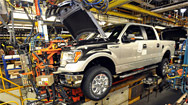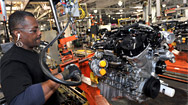Patricia Jurewicz
Director
Responsible Sourcing Network

When it comes to supply chain issues, I’ve had the opportunity to be on different sides, looking at problems from a policy perspective, a corporate perspective and a grassroots advocacy perspective. As a result, I’ve learned that it’s critical to take a multi-stakeholder approach to human rights abuses.
Consumers – especially younger generations – are becoming increasingly aware of global issues and want to know that accountability mechanisms are incorporated into the products they are purchasing, from cell phones to clothing to cars.
Here at the Responsible Sourcing Network, we are especially concerned about the violence and exploitation in the Democratic Republic of the Congo (DRC) that is fueled by revenues from the mining industry. The four “conflict minerals” – tin, tantalum, tungsten and gold – are embedded in today’s consumer electronics and other goods, making the related supply chain problems ubiquitous and enormously complex to solve.
This is similar to what automakers faced a few years ago with charcoal from Brazil. Forced labor was found to be occurring far back in the supply chain at the charcoal level, which was then used in steel and eventually appliances, cars and trucks. Ford worked with the Automotive Industry Action Group (AIAG), government agencies and a local NGO to identify suppliers and have them stop purchasing charcoal made using forced labor. For conflict minerals, the auto industry has had an easier time addressing the issue, because the electronics and telecommunications (ICT) industries had already begun initiatives to trace these minerals to their origin.
While the auto industry was a bit slow in joining efforts to push for solutions in the DRC, I do give it credit for figuring out an industry-wide solution that would meet its needs. Through its work in the AIAG, Ford has been a leader in developing a traceability system for the entire industry. Ford is also active in our multi-stakeholder group and legislative efforts.
Now I would like to see the auto industry do more to encourage smelters to go through the auditing and verification process that was established by the ICT industries. The auto industry can have enormous influence on smelters of tin, which is used in many automobile components. Automakers should use their influence to push for accountability. Smelters need to hear that abuses linked to their raw materials will not be tolerated.
I want to emphasize, however, that companies should not simply ban all materials coming out of the DRC. We feel strongly that jobs – good, safe jobs – are needed in the region. We want companies to support efforts that certify mines, so we know that they are free of forced and child labor, and then to use the certified conflict-free minerals in their products.
Global companies must have transparent and accountable supply chains. They should be able to know where their raw materials originate and under what conditions they are being mined or processed – as I often say, “all the way down to the dirt.” From a diplomatic and policy perspective, the U.S. Securities and Exchange Commission helped to level the playing field when it issued its Conflict Mineral Section 1502 reporting rule. Now all companies are required to disclose where their materials come from.
The U.S. government, regional governments and the United Nations can all do more to encourage peace and stability in conflict zones like the DRC. Corporations can encourage governments and international institutions to do their part to stabilize the region. When governments, human rights groups, investors and corporations are aligned and working together, they can shift revenues away from the human rights abusers and help end the conflict.
Companies today are looking at human rights issues more holistically and deeper in their supply chains than ever before. Businesses recognize that it’s in their best interests to have vibrant, secure, stable and thriving economies where their materials are sourced. That’s a big evolution from a few decades ago when companies would say: “We’re not running that factory or those operations, so they’re not our responsibility.”
One company can’t do much on its own to impact human rights abuses at the “dirt” level of its supply chain. But by working together with an entire industry, that single company can initiate real change.










